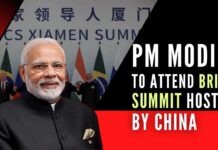Sree Iyer: welcome to PGurus Channel, I’m your host Sree Iyer. Today is episode number 30 of daily updates with Sridhar. We have a lot of stuff to cover especially regarding China, India, the United States. To talk about all this, let’s invite our guests are Sridhar ChityalaJi. Sridhar ChityalaJi Namaskar and welcome to PGurus Channel.
Sridhar Chityala: Namaskar and good morning and good evening and nice to be back.
Sree Iyer: Sir, yesterday China was doing a lot of things. I mean, we highlighted that in our teaser. Hope viewers have seen that the first thing being that they are negotiating with India on the line of actual control, what are your thoughts on that? Do you think India should pull back and agree do it or should India not even consider this because it’s the history of China to always say something and do the exact opposite? Perhaps, now they have weak air because of winter and that’s why they are talking? What are your thoughts?
Sridhar Chityala: Well, I think, my reactions are a very cautious surprise. The reason is just when you see the last one week statements that we are almost on the brink of going to war to the house because China was not complying with. I don’t know how many meetings 20 or 30 meetings that have taken place between the various field commanders in terms of their respective positions. And in the meanwhile, China had built up its infrastructure and India and equally prepared itself with infrastructure and well-prepared to quite a two or a three months war recognizing that there is winter? So all of a sudden you have this kind of strategic retreat, a three-phased retreat that is being worked out for your whole verification processes and mechanisms. I’m looking at China’s track record; China never retreats and never has retreated. And what’s also surprising is that there’s much broader kind of theory things at play here. One is around CPAC, Gilgit-Baltistan, the access around that area, the sovereignty of Gilgit lot of things were mentioned which is still left open. And while that goes issues remain unaddressed to have just merely the line of control as a mechanism for negotiation through this three-phased approach is extremely shocking given that two people, Ajit Doval and Subrahmanyam Jaishankar are experts in actually dealing with China on such matters. I don’t know whether it is a technical decision or whether it’s a political decision. But If I have to put my money, I think it’s a strategic blunder by Modi’s government in terms of taking the specific position. I think so and China also has a track record be it in the ICJ, be it in free trade, be it in the South China Sea. I want somebody to point out where China has seized control or complied with International rules. It only takes about others but it has an empirical history of not complying with any rules of anybody other than its own rules. So in this context, it’s quite worrying that this step has been taken.
Sree Iyer: Thank you, sir. And it should be mentioned here that India has expended a lot of resources getting all the boots on the ground in the line of actual control and it has come at enormous costs when covid has been raging throughout the country and these resources could have been deployed elsewhere, for now, India to take a step back perhaps they should think about this. It was a very earned positional advantage in many places and we don’t know what exactly is going to be the final outcome. It doesn’t seem like the right thing to do. This is just our opinion, based on facts, how China’s behaviour has been in the past. Sir, moving on Mike Pompeo has commented on the absolute murder of democracy that has taken place in Hong Kong by the Chinese government. Yet, President-elect Joe Biden is still mum on this, if he wants to start a transition team consisting of pages and pages of people and it doesn’t have any statement to say about the Chinese aggression in Hong Kong, what is this, is he only a partial president-elect.
Sridhar Chityala: Well it is a fascinating question. And I think you have jerked memory to go back to the previous point and then get back into this. The week on Mike Pompeo made a statement that is to why India is soft and they were 60,000 people sitting there and we are standing by India to protect from the Chinese incursions, we are standing with India. This is just last week before last and now, you can see contextually that he comes back, the elections are complete, we have a little bit of chaos and pandemonium and there is no clarity. And Mike Pompeo is silent, he has not made a statement, I told you, I made my statement India chooses its withdrawal pad and Sorry, you have made the decision. Now, you come to Hong Kong, so, in the Hong Kong situation, when the four opposition members in their legislative council pro-democracy members made noise, they were suspended. So, en masse, the opposition has quit the legislative Council in Hong Kong and China says thank you because we only want Patriots who are saying yes. So, therefore that gives them effective kind of a measure as to what they can do. The immediate response from Mike Pompeo was Hong Kong is not resolved, notwithstanding the fact that this decision has been taken by the Chinese government in terms of the autonomy of Hong Kong, we are still standing by, that’s his position which he again clarified today. Now, Map it to the President-Elect, President-Elect wants to have a position of access to data, intelligence and so on. Neither on Indian Side not on the Hong Kong side while he has commented that he wants to go back and redo the trans-pacific partnership. he wants to re-engage, he is silent on Hong Kong. This is a point that I have constantly kind of critique that it is because of Obama and Biden going to sleep for eight years that the whole situation went out of control in the Indian Ocean, Pacific as well as in the South China Sea. If one recalls both in Syria, the red line was crossed, nothing was done, a lot of criticism. But of course, the liberal media would like us not to be any of those things. Then you have a situation where they implied no-fly zones claiming Sovereignty over the Airways. So, what did we do, we sent planes unarmed, Chinese laughed at us. We told the commercial airlines, people, to fly into those zones and abide by the rules that China has imposed. So, therefore what is very clear is that at least they seem to be prior data and current information. Though, policymakers think they would be no change, no change in position. The fact is that Biden was absent in making his comment around what’s happening in Hong Kong on Democracy. He has not made a statement yet on Hong Kong, he has not made a statement on Tibet, he has not been his statement on Indo-Chinese incursions yet. He supposed to have much deeper knowledge by virtue of eight years being a vice president and 40 years being in power. 40 years holding a position in the houses. So, the story is that is it a precursor and we are seeing the beginning of things being loosened on China.
Sree Iyer: Well, we certainly hope not because China also slapped the Quad alliance by saying that on Sunday the RCEP is going to be signed and viewers you should remember that in RCEP, Japan and Australia are signatories. So it is just India, India has not joined-in, India as walk away from RCEP for good reasons. But now look at these two axes developing. UN is very very far behind in the rearview mirror now. You have the Quad and now you also have this RCEP. Silently China has been working on it and now there is a statement from the Malaysian minister saying that RCEP is going to be signed on Sunday. Very very cleverly orchestrated and it’s like a stinging slap for the face of America while America decides who shall be its president, it’s like when the cat is out the mice are out to play. Sir, what do you make of this RCEP noise.
Sridhar Chityala: It just again reinforces, it further reinforces, China’s strategic – one has to really admire Chinese moves across a broad spectrum of activities, be it on the security side, be it on the diplomacy side, be it on the trade side, be it on its expansionism policies, they are very aligned, they don’t sleep, they do not slacken and their efforts are always consistent. So this conference has been going on and the current Malaysian trade minister is the whatever you call – the Ambassador or the leader for orchestrating the meeting of the RCEP. So this has not been signed for some time. This is not being discussed much at all during the past four years when the Quad discussions were going on. Now suddenly your find RCEP is at play, on Sunday they are going to sign, it is about free trade agreements between these 14 participating Nations. India is important because the declining volumes in the rest of the countries are going to be made up by India. India is a big player. Very soon India will be the third-largest nominal GDP player in the world and it is clearly in Asia, it is the third with China and Japan number one and two and then, of course, India fall and then on PPP basis it is the second largest.
So there are a lot of trade deals that India is doing with players such as Hong Kong, such as Japan, such as Korea, not many people know, Hong Kong is one of the five largest trading partners of India, along with UAE, along with Japan, along with the United States, along with China. So, there is a lot at play that’s why India wants to maintain its strategic flexibility. It doesn’t want to sign and become committed to your quota system. Whereas, Koreans, Japanese, Australia, Singapore and New Zealand are dependent on some kind of an agreement so that there is trade. They already have it through ACEA. But RCEP becomes much more kind of expansive in its scope.
So RCEP being signed right in the middle of a transition is a fascinating move, which they could have done at any given point of time. So three moves, one you have the Indo-China situation, two, the Hong Kong situation, which is where it started, three is the RCEP. Let’s not forget they have strengthened their positions in Tibet as the United States launched one Tibet policy. So effectively along all hope lines, they have asserted themselves.
Is the South China Sea and Taiwan next in China’s playbook, we will know very soon and how the new administration let us say right now it is Biden, how it would play out would be a very interesting few days to watch as to how these things develop. China never never never never slackens, this is another example. It relentlessly pursues the path. They will make Biden sign the Energy Accord, the Environmental Accords, the Paris Accord and laugh while they continue to puff because they don’t have to comply till 2030.
Sree Iyer: Yes indeed and there are still some unanswered questions regarding Hunter Biden’s dealings with China that I don’t know if it’s going to be completely swept under the carpet with the new Administration or something going to emerge out of it with the lights going to come out of it. We’ll have to wait and see. Sir on a different topic, the Secret of success of Narendra Modi in the recently concluded Bihar elections. What’s your take on it, Sir?
Sridhar Chityala: Yes, two points. One is, once again, the liberal media’s exit polls turned out to be absolutely wrong, but they will continue to persist in their activism, in their etiological myth, which is to say we are right, we are right, we are right. So they were saying incumbency, youngsters, this, that, the polls were wrong. What it tells us that Modi has two facets. Modi is a brand. Modi brand is recognizable, trusted, something that delivers on value – that’s one.
Number two – is he backs up his brand with execution. Covid was pointed out and the workers’ movements back to their places were pointed out as a big tactical blunder by Modi and that could have adverse consequences. But the voter said, ‘no, we accept the pandemic, we accept the way the government has treated, the benefits have reached us, and we have been able to deal with the issue, and Modi’s policy has been to target and reach the women by way of benefits. I don’t know all the kind of various programs’ names, but be it free gas, be it free money, be it the provisions, be it the disability insurance, be it a pension, be it life insurance, be it water, be it home, and then using mobile and the Adhaar based accounts has clearly reached the people and it is the people who have received the benefits are responding and those who are still not buying into it like our good friend Mr Chidambaram who goes on saying, let’s watch for the results, what’s going to happen in Bihar and rest of the country? It will be a telling rebuttal of Modi’s programs and inflation and all these things. These guys keep on writing, quite the maturity. They have no magnanimity to accept what is the on-ground reality in terms of the voters? And what is the on-ground reality in terms of the economic outcomes flowing? So as long as they continue to make these hallucinating statements and you have major publications giving them space to write these kinds of things will go on. And Modi has demonstrated you can disconnect the media but connect with people and this is a phenomenal policy that we came to know from former minister of state, external Affairs Mr Akbar – reach, connectivity and development. So in his case, he has demonstrated, he has reached the right people, he has engaged them. and he has given them what is needed in the evaluation of development.
India is not there as yet, but all the programs are around reach, expansion, connectivity and development. And as long as people don’t recognize this, they will continue to be a loser. That is my kind of, you know, I am a million miles away but looking at all the kind of empirical data, you know data tells everything that’s what makes Modi different from the rest of the gang.
Sree Iyer: Thank you, sir. And viewers, those of you who are interested in knowing more about what was it that the former minister with the ministry of external affairs minister of State MJ Akbar said, please do go to YouTube channel of PGurus and search on MJ Akbar and you will see a couple of videos where he lays out what has been the foreign policy change under Modi and that will give you a fairly good insight into how Modi has walked in a very very clever way if a very tricky situation, in a very tricky part of the world and has come out trumps.
So with that, we bring our daily update of today to a close and we’ll be back again tomorrow, same time, same channels, and thanks for watching and sorry for some of the technical difficulties that you face in the middle. I heard that there was a bit of echo of my voice and I think it is fixed now. And it’s a continuous process ladies and gentlemen, and it is not something that comes easy. We are we having an unnatural amount of activity on the internet these days, so these things do happen. But once again, thanks for your support. Do subscribe to PGurus Channel and do donate to our channel liberally. Thank you very much, Sridharji and we’ll be back tomorrow.
Sridhar Chityala: Thank you. Namaskar.
- Xi Jinping treats Chinese people like Ganna (Sugarcane) – Squeeze them & throw them away! - April 9, 2024
- Tharoor Aadat se Majboor - April 7, 2024
- Don’t let Vijender Sleep! - April 6, 2024











[…] To Read More, Please Visit Source […]